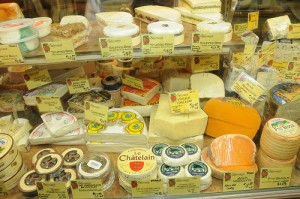The U.S. Department of Agriculture’s Blog
USDA’s Agricultural Marketing Service (AMS) and its sister agencies work to keep markets open to U.S. products. Recently, an inter agency team resolved an issue with Morocco, keeping a $126 million market open for American butter, cheese and other dairy products.
U.S. agricultural exports continue to be a bright spot for America’s economy, worth a record $152.5 billion in fiscal year 2014. That’s why USDA’s Agricultural Marketing Service (AMS) and its sister agencies work so hard to keep these export markets open. So in 2011, when Morocco requested that USDA use a new dairy export certificate that we could not endorse, we launched into action. Our goal was to protect an export market worth $126 million annually while preserving our close relationship with a valued trading partner.
Morocco is the 13th largest export market for our dairy products, and U.S. dairy exports are the fastest growing export category to that country. U.S. companies export many dairy commodities to Morocco, such as butter, cheese and skim milk powder, as well as dairy ingredients such as milk protein and whey protein products.
However, in 2011 Morocco’s agricultural officials requested changes to the information provided on the dairy export certificates issued by the unit I direct, the Grading and Standards Division of within the AMS Dairy Program. Most countries importing U.S. dairy products require these certificates, and issuing them is one of many services my Division provides to exporters to maintain and expand market access.
As a stopgap measure, we began using a general dairy certificate to keep that market open. But then, in April 2014, following numerous detainments of U.S. dairy shipments, we learned that Morocco was considering stopping all U.S. dairy trade if we did not submit a specifically negotiated export certificate.
Beginning in 2011, the AMS Dairy Program worked closely with an existing interagency team of technical experts from AMS, USDA’s Foreign Agricultural Service (FAS) and Animal and Plant Health Inspection Service (APHIS), and the U.S. Food and Drug Administration(FDA) to address the issue. The team submitted a response to Morocco that addressed additives, animal health issues, microbiological criteria and thermal treatment processes, as well as a proposed AMS Sanitary Certificate for Exports for Milk and Milk Products for Human Consumption to Morocco that reflected all the suggested changes.
On November 12, 2014, we received the good news that the government of Morocco had accepted the proposed certificate—without further revision, concluding more than three years of negotiations. The certificate’s acceptance means this important market will remain open to U.S. exports, paving the way for an even better year for the U.S. dairy industry.
USDA and AMS are no strangers to keeping U.S. export markets open. In 2013, the same interagency team responded quickly to changes in China’s regulatory requirements for U.S. dairy exports. Their work helped to secure a market worth $1 billion annually.
We’re committed to keeping dairy and all other U.S. agricultural exports flowing. By maintaining and expanding export markets, we help to strengthen our rural communities that produce the high-quality, American-grown products consumers worldwide desire. And that’s good for everyone.








